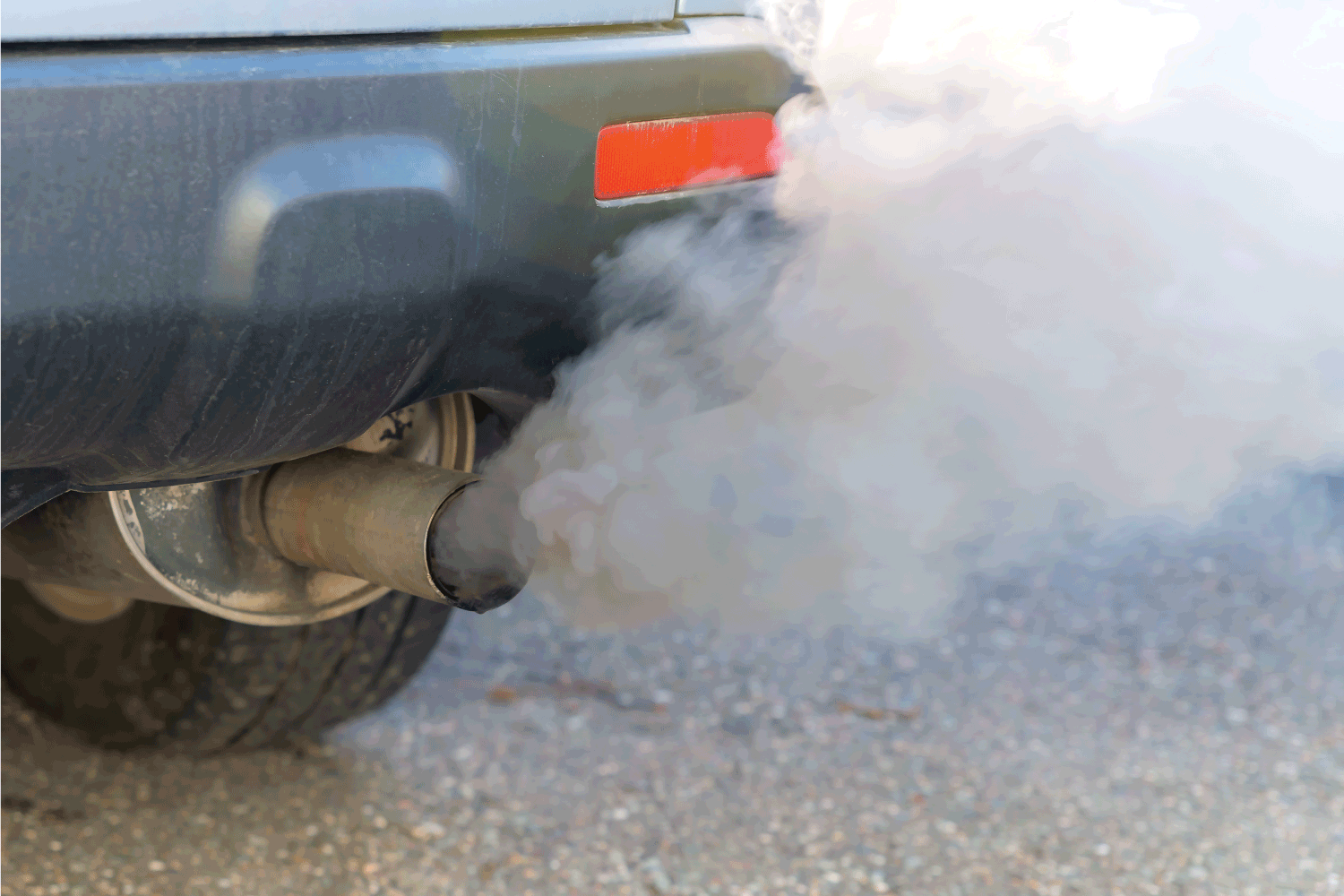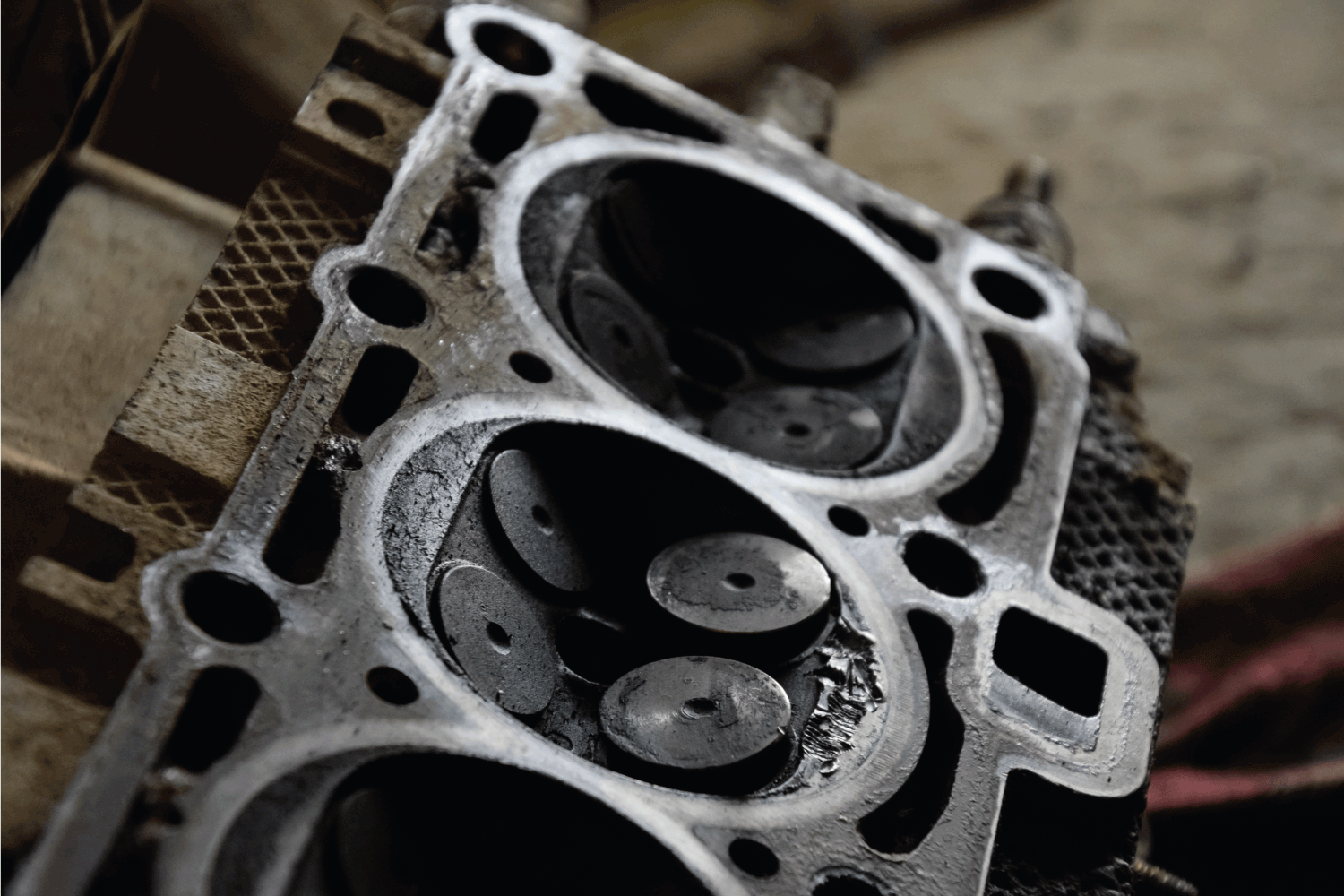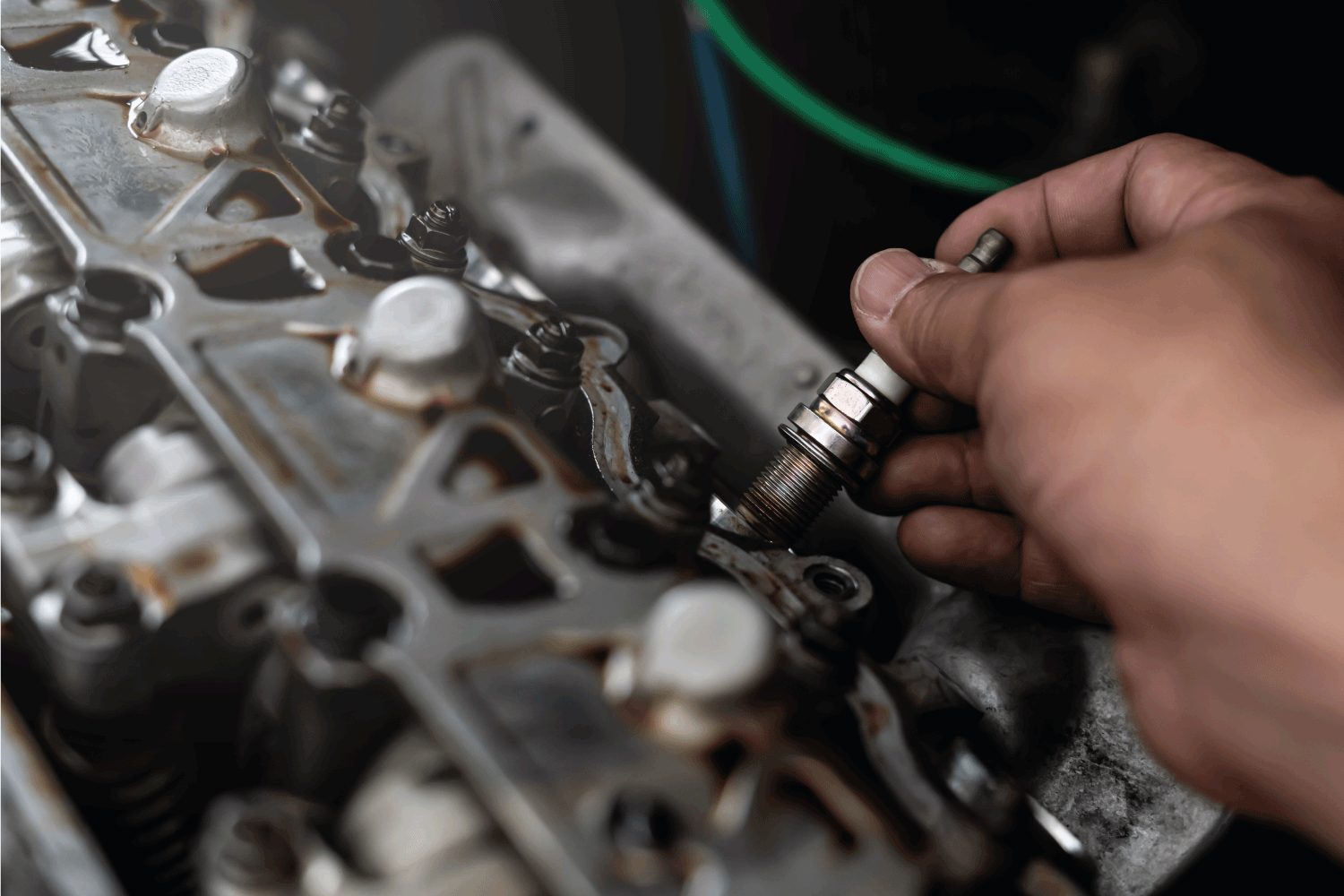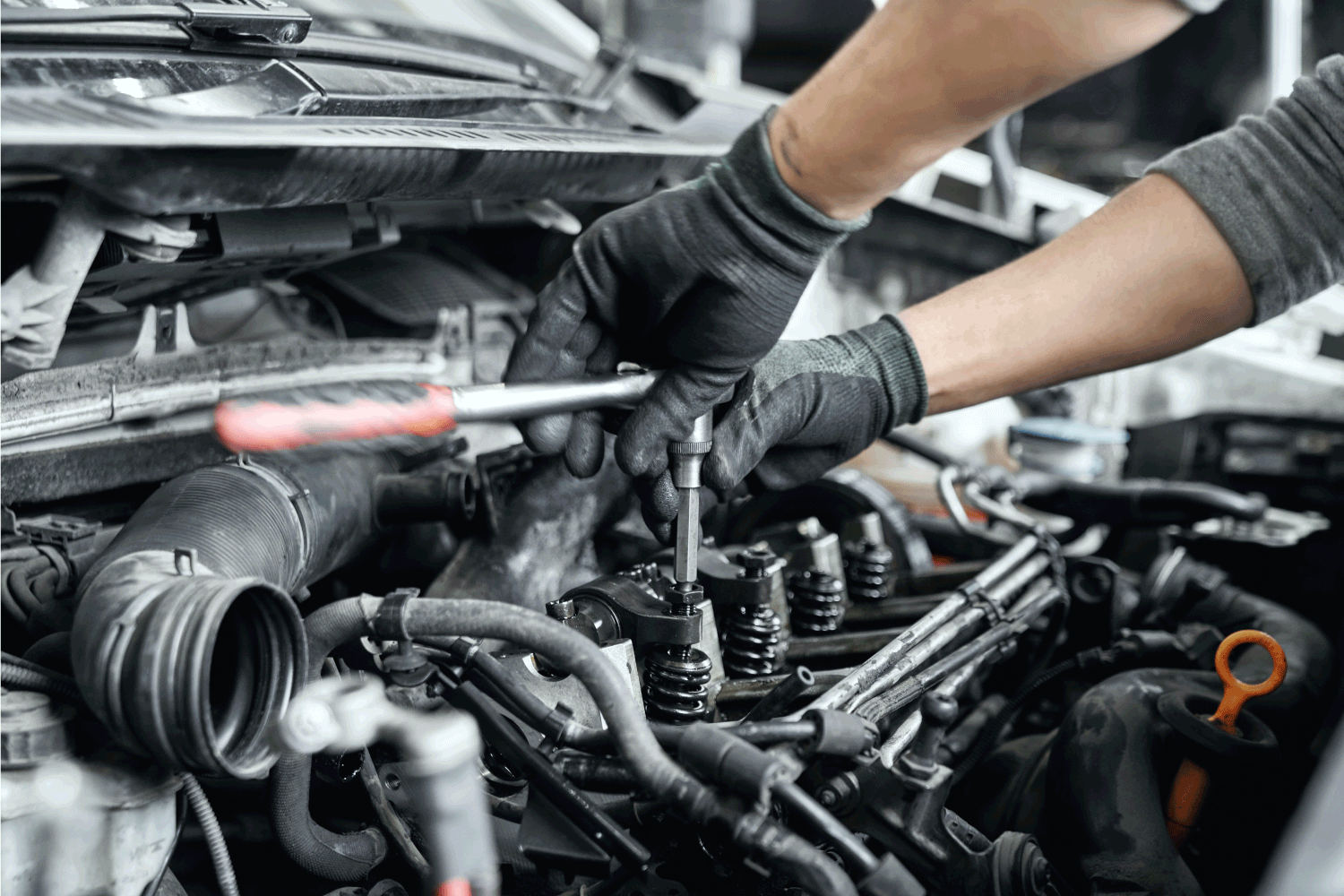Is your car suddenly making knocking sounds that come and go, and you want to know how to get rid of it? You’ve come to the right place, for we have researched this question, and we have the answer for you.
The knocking sound coming from your engine comes from several possible issues that have the potential to cause an even bigger problem. Here are the common causes of engine knock:
- Back pressure
- Bad fuel quality
- Carbon buildup
- Engine overheating
- Failing spark plugs
- Knock sensors failing
- The timing is out of sync
- Vacuum leaks
- Valve lifter failure
Let’s look at each of these issues in detail in the sections below. Then we’ll talk about what you can do to resolve these issues before they get worse and cause an even bigger problem. Read on!
![auto mechanic using the wrench to repairing car engine problem. adjusting valve. sparkplug replacement. bad emission. timing chain. dirty engine head. overheating. Can Engine Knock Come And Go [And How To Fix It]](https://vehq.com/wp-content/uploads/2022/06/repairing-car-engine.-adjusting-valve.-sparkplug-replacement.-bad-emission.-timing-chain.-dirty-engine-head.-overheating.-Can-Engine-Knock-Come-And-Go.png)
What is engine knock?
In most situations, an engine knock is the sound made by your engine when the fuel is not burned thoroughly. It can sound like a metallic tapping or pinging that comes from the engine.
ECUs (or electronic control units) compute the best ratio of air and fuel at different RPMs. An air-to-fuel in the right ratio will burn evenly inside the combustion chamber. The cylinders will compress the mixture, and a spark will ignite it in small batches.
The combustion of each batch will trigger the start of the next batch’s combustion that will happen in the next cylinder.
Engine knock happens when the packets of fuel and air are not the same in size. This causes the triggers to go off in irregular intervals that push cylinders to combust their fuel-and-air mix out of rhythm. When this happens, your engine will generate that knocking or popping sound. This is dangerous because it can damage the walls of the cylinders and even the pistons.

What is an engine exhaust back pressure?
Exhaust gases from the engine naturally travel from inside the combustion chamber to the exhaust pipe. The pressure inside the combustion chamber after combustion can be as high as seven times the atmospheric pressure. The high pressure inside the engine pushes exhaust gases to travel out because of the pressure difference.
However, if something causes the pressure outside the combustion chamber to become higher than the pressure inside the combustion chamber, then the exhaust gases will not travel out. This excess pressure on the exhaust pipe that forces some of the exhaust gases back into the combustion chamber is called back pressure.
One of the causes of back pressure is when there is too much fuel going into the combustion chamber. When this happens, there will be excess fuel that will not burn. This excess fuel will escape the combustion chamber with the exhaust gases.
However, at least a third of the heat that the engine generates also goes out the exhaust pipe. If the exhaust pipe is hot enough to cause the fuel in the exhaust to combust. The resulting explosion creates high pressure in the exhaust pipe that will force exhaust gases—and heat—back into the engine.
This will cause some of the exhaust gases to fail to exit the combustion chamber and limit the combustion—and power—that the engine can generate. Exhaust gases in the combustion chamber create an uneven mix of fuel and air, creating a knocking sound inside the engine.
This can be resolved by checking the air-to-fuel ratio and the parts involved in bringing air and fuel into the engine. Modifying the air-to-fuel ratio can be done by mechanics by accessing the car's computer.
Why does low octane fuel cause knocking?
Low quality or low octane fuel is another cause of an engine knock.
The octane rating of fuel indicates the amount of pressure that the fuel can withstand. A low octane fuel will combust prematurely once the engine reaches a pressure that is beyond what the fuel can tolerate. This is not good if your engine operates at a much higher pressure than your fuel can handle.
The premature combustion causes the knocking sound on your engine. Since the fuel is burned earlier, this creates unnecessary pressure on your pistons. The force from the combustion will force the piston downward while the piston moves upward to complete the cycle.
Opposing forces like this inside the engine can lead to damage to the pistons, the cylinder walls, and the valves. Using fuel with a high-octane rating will address this issue.

Can carbon buildup cause engine knock?
Carbon buildup in the cylinders of your car reduces the amount of space for combustion. The limited space increases the compression inside the cylinders. Carbon deposit still forms inside the engine even though fuels in the US are required to include detergents that can reduce the formation of carbon deposits.
The increase in compressive force inside the engine can damage the cylinders if it goes beyond the material strength of the cylinders. This can also increase the overall temperature of the engine and reduce its efficiency and performance.
The only way to resolve this issue is to have a mechanic clean your cylinders. Alternatively, you can use a fuel additive that cleans your engine of carbon deposits. Add one bottle of carbon cleaner into your fuel tank each time you change the engine oil.
Techron Concentrate Plus fuel system cleaner by Chevron is available on Amazon. Check it out through this link.
Can overheating an engine cause a knock?
An overheating engine is often a sign of a failing cooling system.
One of the problems brought by high temperatures inside the engine is premature ignition. The high temperature inside the engine can ignite the fuel prematurely and cause a knocking sound.
An overheating engine is dangerous because extreme temperatures can warp and damage the parts inside the engine. Bring your car to a professional mechanic to determine the cause of the overheating.

Can failing spark plugs cause knocking?
A failing spark plug can cause knocking because the spark can be too weak to ignite the air-and-fuel mixture. Additionally, if the spark plug becomes too hot, it can suffer a detonation knock where it will prematurely detonate the air-and-fuel mixture.
Replacing the spark plugs will fix this issue. However, it is a good idea to bring your car to a mechanic to ensure that there is no underlying problem.
Can a failing knock sensor cause an engine knock?
A failing knock sensor will trigger the "Check Engine" light. Additionally, it will cause the PCM to fail to recognize a spark knock and will fail to correct it.
This problem leads to a metallic knocking from the engine. This can be accompanied by poor engine performance because the PCM can incorrectly adjust the ignition timing.
Bring your car to a professional mechanic to test your knock sensor for problems. They can also check the surrounding parts for issues.
What happens when engine timing is off?
Everything that happens inside your engine needs to happen at the right timing.
The piston, the intake valve, and the exhaust valve all occupy the same space—the combustion chamber—but at different times. Imagine what will happen if they all try to get into the combustion chamber at the same time.
If the engine timing is off, two or more engine components will be in the same space at almost the same time. This will cause engine components to slam against each other, rub against each other, or prevent one component from getting into the space. Whatever happens, there will be damage inside the engine.
Engine knock is one of the symptoms of bad timing. Misfiring and a hard-to-start engine are also symptoms. Take your car to a mechanic to adjust the timing of your engine before it becomes a bigger problem.

Can a vacuum leak cause an engine knock?
Some emission systems are designed to utilize vacuums to activate switches, actuators, and solenoids in the engine. This is because vacuum systems can handle higher temperatures. A vacuum can be used to manage the EGR valve and the manifold absolute pressure sensor.
A leak in the vacuum line will cause a malfunction in the operation of the emission system and affect the engine, causing an engine knock.
Troubleshooting a vacuum line requires special tools and equipment. Bringing your car to a professional mechanic to locate and patch the leak is the best course of action.
Can a lifter cause a knock?
Hydraulic valve lifters are responsible for maintaining a valve clearance of zero. They are often installed close to or opposite the valve stem.
A faulty lifter might stick into a single position and make a loud knocking, tapping, or ticking sound. This noise is continuous and doesn’t disappear regardless of speed.
Bring your car to a mechanic as soon as possible when you start to hear this sound. It is best to resolve this problem early before it becomes a bigger and more expensive problem.
![car service worker repairing vehicle. Can Engine Knock Come And Go [And How To Fix It]](https://vehq.com/wp-content/uploads/2022/06/car-service-worker-repairing-vehicle.-Can-Engine-Knock-Come-And-Go-And-How-To-Fix-It.png)
Conclusion
There are several causes of an engine knock, and they all have the potential to worsen into a bigger problem if not addressed immediately.
If you enjoyed reading this article, you might find the articles below equally enjoyable to read:

